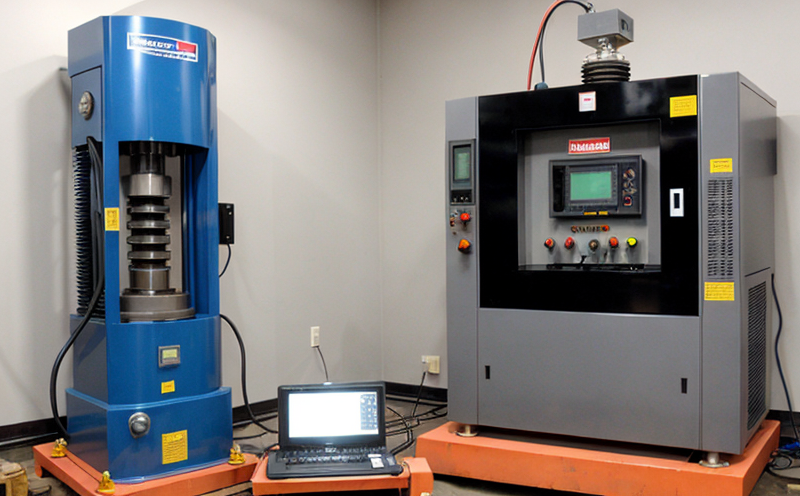AEC Q101 014 Mechanical Shock Testing for Discrete Semiconductors
The Automotive Electronics Council (AEC) Q101 014 standard is a critical requirement that ensures the reliability and durability of discrete semiconductors used in automotive applications. This testing protocol focuses on assessing how components withstand mechanical shocks, which are common during transportation and installation processes. The test is designed to validate whether the component can maintain its electrical performance under these harsh conditions.
The standard applies primarily to discrete semiconductors such as diodes, transistors, and thyristors used in automotive electronics. These components must be capable of withstanding mechanical shocks without affecting their operational characteristics. The testing method involves subjecting the component to a series of rapid changes in acceleration, simulating real-world shock events encountered during transportation or installation.
The test setup typically includes specialized equipment that can generate controlled shock pulses. The parameters for these shock pulses are meticulously defined by AEC Q101 014 and include peak accelerations, pulse duration, and the number of cycles to be applied. Compliance with this standard is essential for manufacturers seeking certification from key automotive suppliers, ensuring their products meet stringent quality and reliability standards.
From a technical standpoint, the test setup may involve a drop tower or vibration table that can deliver controlled shock pulses. The specimen preparation involves securing the component in a fixture to ensure it remains in place during the test. Post-test evaluation focuses on verifying that the electrical characteristics of the component have not been altered by the mechanical shocks.
The importance of this testing cannot be overstated, especially for components used in critical automotive systems such as braking systems or engine controls. A single failure due to shock can lead to significant safety issues. Compliance with AEC Q101 014 ensures that these components are robust enough to withstand the rigors of automotive environments.
Understanding the scope and requirements of this test is crucial for quality managers, compliance officers, R&D engineers, and procurement teams involved in semiconductor development or sourcing. It helps ensure that the correct tests are conducted and that suppliers deliver products meeting the highest standards required by the automotive industry.
Eurolab Advantages
At Eurolab, we offer comprehensive mechanical shock testing services tailored to meet the stringent requirements of AEC Q101 014. Our expertise and state-of-the-art facilities ensure that your discrete semiconductors undergo robust testing that accurately simulates real-world conditions.
- ISO/IEC 17025 Accreditation: Ensuring all our tests comply with international standards for accuracy and reliability.
- Experienced Engineers: Our team of engineers has extensive experience in semiconductor testing, providing detailed insights into test procedures and results.
- Advanced Equipment: Utilizing cutting-edge equipment to deliver precise and consistent shock pulses that meet AEC Q101 014 standards.
We pride ourselves on delivering accurate and timely test reports, ensuring you have all the necessary documentation for compliance. Our commitment to quality and reliability is unmatched in the industry, making us a trusted partner for automotive electronics manufacturers.
Our services are designed not only to meet current standards but also to anticipate future requirements, providing you with a competitive edge in an ever-evolving market.
International Acceptance and Recognition
- Automotive Industry: AEC Q101 014 is widely accepted across the automotive sector as it ensures that components meet stringent reliability standards. Compliance with this standard is often a prerequisite for suppliers to be considered by major automotive manufacturers.
- Electronics Manufacturers: The test results generated from compliance with AEC Q101 014 are recognized globally, making it easier for electronics manufacturers to export their products and enter new markets.
- Safety Authorities: Compliance with this standard can also satisfy safety regulatory bodies, ensuring that the components meet both industry and government requirements.
The acceptance of AEC Q101 014 extends beyond the automotive sector. Its principles are often applied in other industries where reliability under shock conditions is critical, such as aerospace or defense electronics.
By adhering to these standards, manufacturers can ensure that their products meet global quality and safety benchmarks, facilitating smoother international trade and compliance with local regulations.
Competitive Advantage and Market Impact
- Enhanced Reliability: Compliance with AEC Q101 014 demonstrates a commitment to product reliability, which is crucial in the automotive industry. This can translate into higher customer satisfaction and loyalty.
- Differentiation in Market: By offering products that meet these stringent standards, manufacturers can differentiate themselves from competitors and command premium pricing.
- Increased Supplier Trustworthiness: Suppliers who comply with AEC Q101 014 are perceived as more reliable and trustworthy, leading to stronger relationships with automotive OEMs.
The competitive advantage gained through compliance extends beyond the immediate market. It also opens doors to new opportunities and collaborations within the broader electronics industry. Manufacturers who can demonstrate their commitment to quality by meeting these standards are better positioned for future growth and innovation.
Moreover, the recognition of AEC Q101 014 in global markets enhances a manufacturer's reputation, making it easier to penetrate new regions and establish a strong foothold in international trade.





